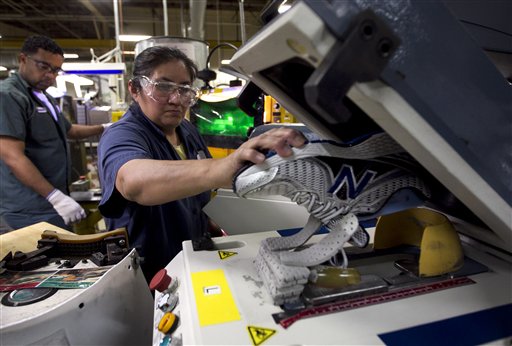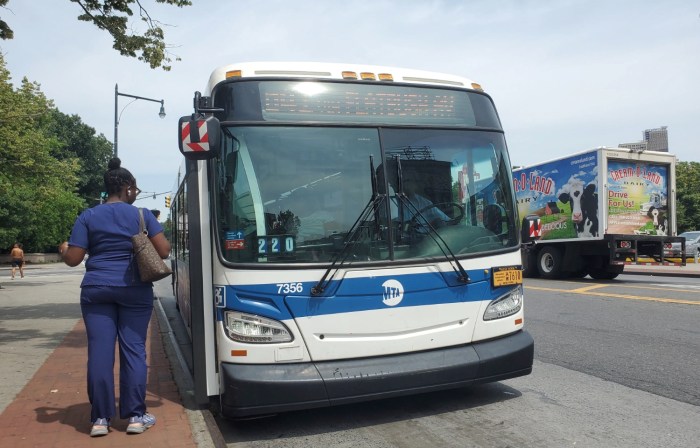
The U.S. economy grew at an annual rate of just 1.5 percent from April through June, as Americans cut back sharply on spending. The slowdown in growth adds to worries that the economy could be stalling three years after the recession ended.
The Commerce Department also said Friday that the economy grew a little better than previously thought in the January-March quarter. It raised its estimate to a 2 percent rate, up from 1.9 percent.
Growth at or below 2 percent isn’t enough to lower the unemployment rate, which was 8.2 percent last month. And most economists don’t expect growth to pick up much in the second half of the year. Europe’s financial crisis and a looming budget crisis in the U.S. are expected to slow business investment further.
“The main take away from today’s report, the specifics aside, is that the U.S. economy is barely growing,” said Dan Greenhaus, chief economic strategist at BTIG LLC. “Along with a reduction in the actual amount of money companies were able to make, it’s no wonder the unemployment rate cannot move lower.”
Stock futures rose slightly after the report was released. Some economists had thought the growth estimate would be even lower.
The lackluster economy is raising pressure on President Barack Obama in his re-election fight with Mitt Romney, the presumptive Republican presidential nominee.
But few think the Fed, the White House or Congress can or will do anything soon that might rejuvenate the economy quickly. Many lawmakers, for example, refuse to increase federal spending in light of historically large budget deficits.
Paul Dales, senior U.S. economist at Capital Economics, said that the sluggish second quarter growth rate is probably not weak enough to trigger more action by the Federal Reserve when it meets next week.
Many economists, however, believe the Fed will launch another round of bond buying at its September policy meeting. The aim is to drive long-term interest rates lower and encourage more borrowing and spending.
The 1.5 percent growth rate in the second quarter was the weakest since the economy, as measured by the gross domestic product, expanded at a 1.3 percent rate in the July-September quarter last year. GDP measures the country’s total output of goods and services, from the purchase of a cup of coffee to the sale of fighter jets.
Current-dollar GDP increased at an annual rate of $117.6 billion in the second quarter to $15.6 trillion.
Growth was weaker mostly because consumer spending slowed to a growth rate of just 1.5 percent. That’s down from 2.4 percent in the first quarter. Americans bought fewer autos, computers and other long-lasting manufactured goods. Spending on services increased.
They also saved more. The savings rate increased to 4 percent, up from 3.6 percent in the first quarter.
Consumer spending, which accounts for 70 percent of economic activity, was offset somewhat by a slightly smaller drag from the government. Spending by governments fell at an annual rate of 1.4 percent in the second quarter, just half of the 3 percent rate of decline in the first quarter.
The Commerce Department also revised its growth estimates for the past three years. Those revisions showed that the economy contracted 3.1 percent in 2009, slightly less than the 3.5 percent previously reported. Growth in 2010 was put at 2.4 percent, down from 3 percent, with growth in 2011 at 1.8 percent instead of 1.7 percent.
The U.S. economy has never been so sluggish this long into a recovery. The Great Recession officially ended in June 2009.
Until a few weeks ago, many economists had been predicting that growth would accelerate in the final six months of the year. They pointed to gains in manufacturing, home and auto sales and lower gas prices.
But threats to the U.S. economy have left consumers too anxious to spend freely. Jobs are tight. Pay isn’t keeping up with inflation. Retail sales fell in June for a third straight month. Manufacturing has weakened in most areas of the country.
Fear is also growing that the economy will fall off a “fiscal cliff” at year’s end. That’s when tax increases and deep spending cuts will take effect unless Congress reaches a budget agreement.
All that is making companies reluctant to expand and hire much.
Copyright 2012 The Associated Press.






























